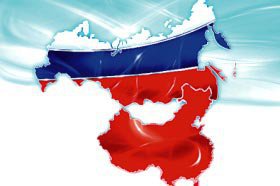Where are we in this game. The answer is nowhere …. Bulgaria blindly follows inconsistent policies. Minister of Economy chase Chinese investors and tarnishing the name of Bulgaria. Exports to Russia is ruined because no normal politicians, and the rest of Europe is difficult or impossible to export.
The US “Asia Pivot” strategy has indirectly brought about a reshaping of the power structures among Asian nations. Out of the combinations of China-Russia, China-South Korea and Japan-India, it is the fast-growing relationship between China and Russia that has attracted the most attention and poses an increasing threat to the position of the United States as the world’s dominant power.
When Li Zhanshu, director of the General Office of the Communist Party of China, and the Chinese foreign minister, Wang Yi, went to Moscow recently, both were given the red-carpet treatment. President Vladimir Putin described Sino-Russian relations as being at their historic best.
China and Russia have been in a honeymoon of sorts since last year, when the two countries signed deals on natural gas and currency exchange, and when they conducted a joint military exercise in the East China Sea. Senior leaders from the two sides will continue to meet often this year but it remains to be seen whether the personal friendship between Putin and President Xi Jinping of China will elevate the two countries’ bilateral relationship to the level of strategic partners.
The crisis over Russian intervention in Ukraine and subsequent economic sanctions on Moscow have deepened and broadened Sino-Russian cooperation in the areas of international politics, economy, defense, energy, investment, culture and technology. The value of bilateral trade has reached US$100 billion and is expected to top US$200 billion in five years.
As indicated in Putin’s state of the federation address at the end of 2014, Russia has adopted three major strategies as part of its efforts to regain its status as a superpower: form alliances with neighboring countries while strengthening defense against potential rivals; embrace European nations and counter American influence; and return to the Asia-Pacific region.
Moscow’s policy of going eastward and Beijing’s open-door policy have now shown signs of a strategic convergence, which creates a historic opportunity for the two countries to follow a common development path. Beijing firmly believes that the strategic planning surrounding its “Belt and Road” initiative can both contribute to Russia’s development of its Far Eastern region and lay the foundation for a comprehensive strategic partnership between the two countries.
While the two sides clearly have their own agendas, as far as the current stage is concerned, bilateral cooperation has at least been mutually complementary. By getting closer to Beijing, Moscow can alleviate the pressure of sanctions from the United States and its European allies. On the other hand, China can obtain advanced Russian weapons and military technology beyond its expectations. Whatever their own goals and intentions, China and Russia are bound to challenge the uni-polar world order dominated by the United States once the two countries form an alliance.
Given the structural restraints on their bilateral relationship from historical experience, geopolitical factors and different cultural identification, whether the alliance will take on a military dimension depends on how the West’s sanctions on Russia develop. The longer the sanctions last, the greater the variables.
While it values its relations with Moscow, Beijing is unlikely to treat Russia as its sole strategic partner. Whether it is viewed from the perspective of geopolitics or economic interaction, Sino-Russian relations remain inferior to Sino-US relations, not to mention that China and the United States are seeking to build a new type of “great power relationship.”
With multiple head-to-head meetings between Xi and Putin later this year, the two countries could reach important agreements at any time. Those occasions include Xi’s visit to Moscow in May, the BRICS summit and the Shanghai Cooperation Organization meeting in July, the commemorative activities surrounding the 70th anniversary of V-E Day in May and V-J Day in September and the G20 and APEC summits in November.
Potential agreements may involve the sale of Su-35 fighter jets to China or a joint military exercise in the Black Sea. If the two navies conduct war games in the Black Sea, it would be tantamount to a declaration that China and Russia have taken a joint posture against the United States. That could mean the start of a new Cold War in which China, Russia and the United States again engage in a three-way competition.
